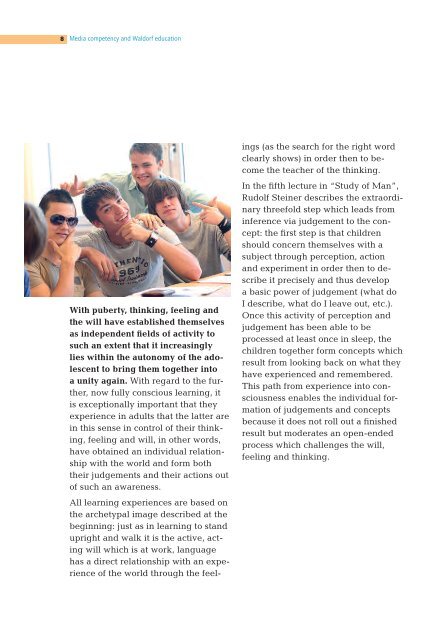Struwwelpeter 2.0
Struwwelpeter_engl_August_2015
Struwwelpeter_engl_August_2015
- No tags were found...
Create successful ePaper yourself
Turn your PDF publications into a flip-book with our unique Google optimized e-Paper software.
8 Media competency and Waldorf education<br />
With puberty, thinking, feeling and<br />
the will have established themselves<br />
as independent fields of activity to<br />
such an extent that it increasingly<br />
lies within the autonomy of the adolescent<br />
to bring them together into<br />
a unity again. With regard to the further,<br />
now fully conscious learning, it<br />
is exceptionally important that they<br />
experience in adults that the latter are<br />
in this sense in control of their thinking,<br />
feeling and will, in other words,<br />
have obtained an individual relationship<br />
with the world and form both<br />
their judgements and their actions out<br />
of such an awareness.<br />
All learning experiences are based on<br />
the archetypal image described at the<br />
beginning: just as in learning to stand<br />
upright and walk it is the active, acting<br />
will which is at work, language<br />
has a direct relationship with an experience<br />
of the world through the feelings<br />
(as the search for the right word<br />
clearly shows) in order then to become<br />
the teacher of the thinking.<br />
In the fifth lecture in “Study of Man”,<br />
Rudolf Steiner describes the extraordinary<br />
threefold step which leads from<br />
inference via judgement to the concept:<br />
the first step is that children<br />
should concern themselves with a<br />
subject through perception, action<br />
and experiment in order then to describe<br />
it precisely and thus develop<br />
a basic power of judgement (what do<br />
I describe, what do I leave out, etc.).<br />
Once this activity of perception and<br />
judgement has been able to be<br />
processed at least once in sleep, the<br />
children together form concepts which<br />
result from looking back on what they<br />
have experienced and remembered.<br />
This path from experience into consciousness<br />
enables the individual formation<br />
of judgements and concepts<br />
because it does not roll out a finished<br />
result but moderates an open-ended<br />
process which challenges the will,<br />
feeling and thinking.


